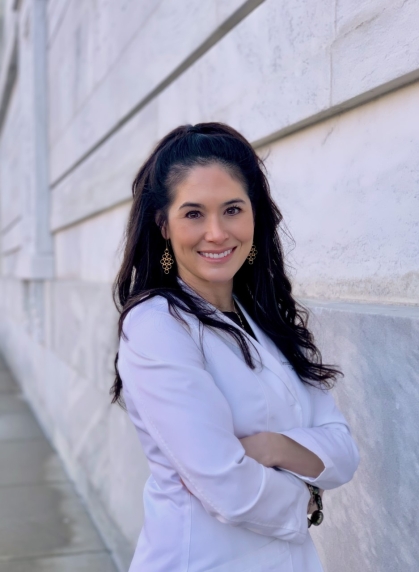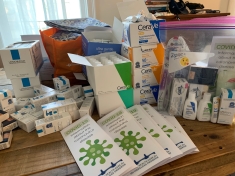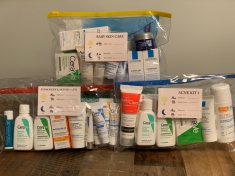
A Publication for Alumni & Friends of Rutgers Robert Wood Johnson Medical School

Improving the Health of Marginalized Communities: Jennifer Tan, MD ’06, FAAD, Provides Skincare to the Homeless Community in Boston

As both an undergraduate at Rutgers University and medical student at Rutgers Robert Wood Johnson Medical School, Jennifer Tan, MD ’06, FAAD, planned to pursue a career in community health because of her passion for helping the underserved. After rotating in dermatology in medical school, however, Dr. Tan fell in love with the multi-dimensional, cross-specialty aspect of dermatology and refocused her education to pursue that area. Not wanting to give up her altruistic reasons for becoming a physician, Dr. Tan was able to blend her two interests by creating a career where she can give highly specialized care in an area she loves to the most vulnerable patients.
Dr. Tan now oversees the Boston Health Care Homeless Program’s dermatology clinic, caring for the skin of the homeless population. Her work has led to the American Academy of Dermatology naming her a “Patient Care Hero” for making skin care and hygiene items accessible to those experiencing homelessness during the COVID-19 pandemic.
Merging Interests to Create a Career
In her role as student director of the Homeless and Indigent Population Health Outreach Project (HIPHOP) Community Health Initiative during medical school, Dr. Tan worked closely with physicians and community leaders and learned about health disparities.
Dr. Tan also was an active member of the of the HIPHOP Promise Clinic, a student-led clinic that provides health care and social services to the underserved and uninsured population at Elijah’s Promise Soup Kitchen in New Brunswick, N.J. Starting the program gave her the tools to set up a similar program later on as a resident in dermatology.
She shares, “If not for my experience at RWJ, I wouldn’t have been exposed to or understood the state of poverty in America and what I could do as a doctor to help. I’m so proud to be an alumna of a school that has prioritized health care disparities and community health as important components of the curriculum.”
During a fourth-year rotation in dermatology, she became immensely passionate about this area of medicine. “I enjoyed the visual aspect of dermatology as well as the overlap between other specialties. The complex nature attracted me to the field,” she reflects.
At the time, career trajectories in what she found interesting medically—dermatology—didn’t line up with her passion for community work. However, over time and with the right mentorship, she was able to create a path that did not exist and merge her passions. Dr. Tan shares, “During residency, I sought out mentors in both homeless medicine and dermatology to figure out a way to marry those two interests.”
Dr. Tan completed her residency training at the Harvard Combined Dermatology Residency Program, where she served as chief resident before completing a fellowship in pediatric dermatology at Boston Children’s Hospital.
Now, she shares time between Boston Health Care for the Homeless Program (BHCHP) and the Department of Dermatology at Massachusetts General Hospital, where she sees patients at the Charlestown Community Health Center. In addition to her clinical role, Dr. Tan teaches residents and students at Harvard Medical School, whom she finds socially conscious, inspiring, and interested in solving health care inequities.
Of her teaching experience, she says, “I enjoy showing students that it is okay to choose an unconventional career path and that it’s possible to unify their passions in an innovative way. I am fortunate to have a career that involves patient care, teaching, and the development of dermatology programs within homeless medicine.”
Boston Health Care Homeless Program
In the homeless population, studies have described increased prevalence of skin infections, such as bacterial, fungal, and ectoparasitic infections. Inflammatory conditions, traumatic injuries, and other skin issues resulting from long periods of standing on their feet or being exposed to the sun also occur. For persons experiencing homelessness, Dr. Tan has observed avoidable hospitalization because of untreated skin diseases that become infected and advanced—up to 20 percent of Emergency Department and community clinic visits from persons experiencing homelessness are for skin-related issues.

These observations and statistics led Dr. Tan to seek out ways to help. During her residency at Boson General Hospital, Dr. Tan met a dermatology professor who began volunteering with the BHCHP in 1988. She started shadowing Ernesto Gonzalez, MD, and since then, they have worked together to build a dermatology collaboration within BHCHP.
At first, the collaboration between BHCHP and the Harvard Dermatology Combined Residency Program was an informal consultation service. Dr. Tan and Dr. Gonzalez transformed this program into a formal consultation service and integrated it into the dermatology training program for residents. Over time, the high prevalence of skin disease in the population dictated the need for a weekly clinic, as well as a bi-monthly service for pediatric patients and families. Both Dr. Tan and Molly Cavanaugh-Hussey, MD, of Brigham and Women’s Hospital, are now on staff at BHCHP, caring for several hundred patients each year.
The clinic is always staffed by a board-certified dermatologist, which Dr. Tan says is very unique. She explains, “Many clinics that serve homeless patients or underserved communities are volunteer clinics or student-run clinics, with rotating care givers. Our dermatology clinic is always supervised by one or two dermatologists, which provides great continuity of care for patients.” Dr. Tan emphasizes that this stability builds trust with a population who may be weary of the health care system.
Says Dr. Gonzalez about the clinic’s transformation, “Jennifer has become the institutional face of the service by transforming the service to a holistic endeavor with the development of specialty clinical service. Jennifer’s personal attributes of empathy and passion for her craft underscores this unique service, which has been recognized nationally. It is a journey of love and commitment for the socially disenfranchised that Jennifer displays genuinely and should serve as stimulus for others to follow.”

Skin Care Kits for the Homeless
Led by Dr. Tan and fourth-year Harvard medical students Haya Raef, Samantha Guhan, and Lindsay McCormack, the team at Massachusetts General Hospital and BHCHP had begun distributing skin care kits to the homeless population even before the pandemic. These care packages provide over-the-counter products to address basic skin issues and were made possible by generous donations from L’Oréal Cosmetics, Toms, and Maine and Fabrizio Spirits.
When the COVID-19 pandemic started, the group knew homeless communities would have barriers to accessing hygiene supplies, putting them more at risk for infection. The kits were transformed to provide basic hygiene supplies for those experiencing homelessness and include soap, hand sanitizer, cleansers, moisturizers, dental care, information about COVID-19, puzzles, and earbuds.
Spearheaded by Raef, the program has distributed more than 1,000 free kits to shelters, clinics, and field hospitals. The homeless community is diagnosed with COVID-19 at higher rates than others, making access to preventive hygiene measures even more crucial. In an article published in the Journal of the American Academy of Dermatology, Dr. Tan wrote about the initiative’s success, with the goal of illustrating ways for the dermatology community to help people experiencing homelessness during the pandemic and beyond.
Shares Dr. Tan, “All medical care providers can improve the health of marginalized communities. If I can be an example of how a specialist can contribute towards the broader goal of ending homelessness and inspire others to do the same, then I’ve been successful at my job.”
